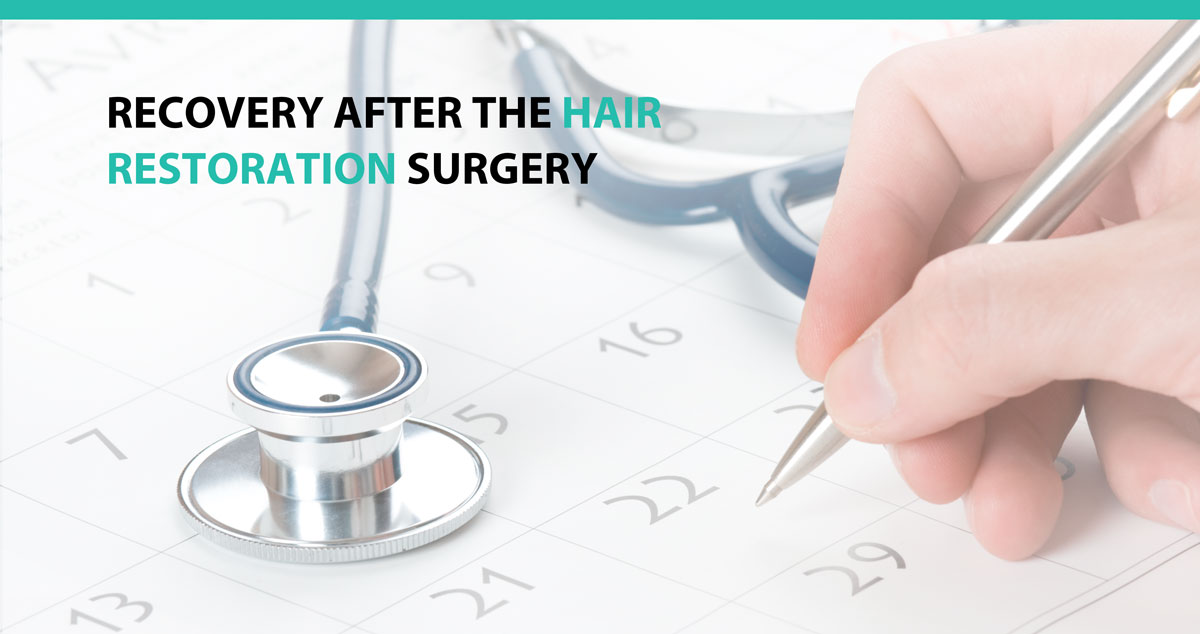
After your successful hair transplant surgery, you won’t have to wait long to enjoy its benefits. Although Dr. Joseph Williams‘ excellent skills will help you achieve the desired results, your post-op lifestyle also influences the recovery process. Other factors include the type of procedure you had, as well as the extent of hair restoration.
How Long Does Recovery Take?
Once the surgery is complete, you’ll have a protective wrap and cap on your head for 24 to 72 hours. After the post-operative exam, you’ll be free to go back home and heal in comfort. You’re advised to spend as much time as you can laying down to avoid swelling.
Remember to dutifully take the provided painkillers and antibiotics while observing a healthy diet. You’ll be able to get back to work and other daily activities three to five days after surgery. After two to three weeks, you’ll notice the grafted hair falling off. Don’t panic, as that is part of the recovery process. The hairs might fall off, but the transplanted follicles will remain intact.
After about six months, 60 to 80% of new hair should have grown on your previously bald scalp. You’ll have a smooth recovery if you follow all the recommended after-surgery guidelines.
Post-Op Care Tips
The following recommendations are guaranteed to hasten your recovery:
- Avoid dryness: Although the area isn’t supposed to get wet, don’t let it get too dry either. The post-operative kit you’ll receive includes a spritz with healing properties to keep it moisturized.
- Avoid exercise and other strenuous activity: To avoid swelling, sleep at a slightly propped posture, preferably a 45-degree angle. A neck pillow helps you sleep more soundly. A cold pack also helps in soothing the area if you feel some irritation. Avoid intense workouts and sexual activity in the first week after surgery because they might trigger swelling and scalp pain.
- Wash carefully: Dr. Joseph Williams will prescribe a special foam and shampoo that you’ll use for the first two weeks after surgery. In the first week, you’ll apply it gently with your hands, then rinse with lukewarm water. From the second week, you can start massaging your scalp.
Other harmful activities and habits include smoking, using alcohol, and caffeinated products. Avoid prolonged exposure to the sun, shaving with electric razors, hair styling products, and scratching for at least one month after the procedure.
Medication During Recovery
Other than surgery, medication helps you achieve the desired outcome of a hair transplant procedure. Potential side effects include mild bleeding, some discharge, pimples, itchiness, and redness on the donor area. You’ll receive a prescription for antibiotics that should be taken at least twice daily. They’re most effective when taken after a full meal, preferably breakfast and dinner.
Dr. Williams will also prescribe some painkillers and anti-inflammatories to help prevent itchiness, swelling, and other irritations. You should also take them at least twice daily.
How Long Does It Take to Have a Full Head of Hair?
Six to nine months after surgery, you should have noticeable hair growth, which should be enough to pass a comb through. This development not only gives you a youthful look but also increases hair styling options.
After 12 months, the growth will be complete. You’ll have a full head of transplanted hair that will be identical to the rest of your natural hair. It will be impossible for others to tell you had a procedure unless you volunteer the information. You’ll also be able to do everything you’d normally do to natural hair, including washing, shaving, and styling.
Are you experiencing male pattern baldness and other types of hair loss? The Advanced Hair Institute offers comprehensive and permanent solutions to these problems. Using the latest technology, Dr. Joseph Williams employs his expertise and decades of experience to achieve the highest quality result. Schedule a consultation today for a detailed explanation.










